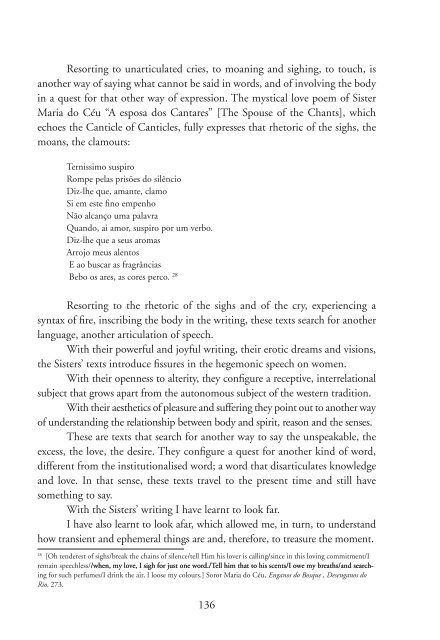Teaching Subjectivity. Travelling Selves for Feminist ... - MailChimp
Teaching Subjectivity. Travelling Selves for Feminist ... - MailChimp
Teaching Subjectivity. Travelling Selves for Feminist ... - MailChimp
You also want an ePaper? Increase the reach of your titles
YUMPU automatically turns print PDFs into web optimized ePapers that Google loves.
Resorting to unarticulated cries, to moaning and sighing, to touch, is<br />
another way of saying what cannot be said in words, and of involving the body<br />
in a quest <strong>for</strong> that other way of expression. The mystical love poem of Sister<br />
Maria do Céu “A esposa dos Cantares” [The Spouse of the Chants], which<br />
echoes the Canticle of Canticles, fully expresses that rhetoric of the sighs, the<br />
moans, the clamours:<br />
Ternissimo suspiro<br />
Rompe pelas prisões do silêncio<br />
Diz-lhe que, amante, clamo<br />
Si em este fino empenho<br />
Não alcanço uma palavra<br />
Quando, ai amor, suspiro por um verbo.<br />
Diz-lhe que a seus aromas<br />
Arrojo meus alentos<br />
E ao buscar as fragrâncias<br />
Bebo os ares, as cores perco. 28<br />
Resorting to the rhetoric of the sighs and of the cry, experiencing a<br />
syntax of fire, inscribing the body in the writing, these texts search <strong>for</strong> another<br />
language, another articulation of speech.<br />
With their powerful and joyful writing, their erotic dreams and visions,<br />
the Sisters’ texts introduce fissures in the hegemonic speech on women.<br />
With their openness to alterity, they configure a receptive, interrelational<br />
subject that grows apart from the autonomous subject of the western tradition.<br />
With their aesthetics of pleasure and suffering they point out to another way<br />
of understanding the relationship between body and spirit, reason and the senses.<br />
These are texts that search <strong>for</strong> another way to say the unspeakable, the<br />
excess, the love, the desire. They configure a quest <strong>for</strong> another kind of word,<br />
different from the institutionalised word; a word that disarticulates knowledge<br />
and love. In that sense, these texts travel to the present time and still have<br />
something to say.<br />
With the Sisters’ writing I have learnt to look far.<br />
I have also learnt to look afar, which allowed me, in turn, to understand<br />
how transient and ephemeral things are and, there<strong>for</strong>e, to treasure the moment.<br />
28<br />
[Oh tenderest of sighs/break the chains of silence/tell Him his lover is calling/since in this loving commitment/I<br />
remain speechless//when, /when, my love, I sigh <strong>for</strong> just one word./Tell him that to his scents/I owe my breaths/and searching<br />
<strong>for</strong> such perfumes/I drink the air, I loose my colours.] Soror Maria do Céu, Enganos do Bosque , Desenganos do<br />
Rio, 273.<br />
136

















